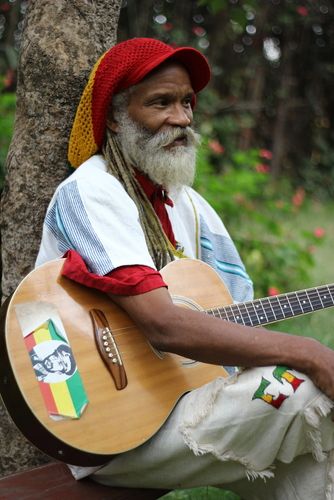 The biopic Bob Marley: One Love has captured audiences worldwide with its portrayal of the legendary reggae icon's journey. While illuminating Bob Marley's sometimes chaotic and often powerfully moving career in music, the film doesn't shy away from showing Marley's activism and spiritual struggles. One interesting aspect of the film is how it depicts the profound influence of the Rastafari religion on Bob Marley's life and music.
The biopic Bob Marley: One Love has captured audiences worldwide with its portrayal of the legendary reggae icon's journey. While illuminating Bob Marley's sometimes chaotic and often powerfully moving career in music, the film doesn't shy away from showing Marley's activism and spiritual struggles. One interesting aspect of the film is how it depicts the profound influence of the Rastafari religion on Bob Marley's life and music.
A Surprise Hit With Audiences
Music biopics can be hit or miss with audiences, but Bob Marley: One Love has drawn people to the box office. The film features Kingsley Ben-Adir, a British actor of Trinidadian descent, in the lead role and received the support of members of the Marley estate as producers.
Audiences get to watch the story of how Bob Marley made Exodus, perhaps his most well-loved and iconic album. The climax of the film sees Marley perform for a huge crowd in his homeland of Jamaica.
The critics' score for the film on _Rotten Tomatoes _is only 43%, marking the film with a "rotten" rating. However, the audience score sits at 92%. This suggests that the love people have for Bob Marley is alive and well and that fans of his music are supporting the film.
Rastafari Faith and Bob Marley
Bob Marley was a proud Rastafari, a religion dating back to the 1930s in Jamaica. Rastafari beliefs blend elements of the Old Testament with a longing for a return to Africa.
The Rastafari religion grew as a movement in response to colonial oppression. In 1920, Marcus Garvey, a prominent anti-colonial and anti-racist Jamaican activist, declared that oppressed peoples of the African diaspora should look to Africa for leadership and enlightenment in the form of a "Black King." This prophecy seemingly came true in 1930 when Haile Selassie ascended the throne to become Emperor of Ethiopia.
Activists in Jamaica at the time took Haile Selassie's ascension as a sign from God. A few years later, the Rastafari religion began to take off in Jamaica and other areas of the Caribbean.
The Central Tenets and Practices of Rastafari Religion
Rastafaris believe in one God, much like Christians, and they call God by the name "Jah." Bob Marley often uses this name for God in his music.
According to Rastafari beliefs, the relationship that individuals have with God is intimate, personal, and sacred. Haile Selassie is seen as a divine figure, and the religion promotes the idea that all the people of the African diaspora and their descendants will achieve liberation and unity.
People who follow the Rastafari religion reject materialism and prioritize a harmonious connection with nature. They often grow their hair into dreadlocks as a symbol of their faith.
Marijuana and Rastafari Spirituality
Rastafaris use marijuana in religious rituals and also consider its consumption to be a conduit to enlightenment. However, many governments do not support this practice and actively persecute Rastafaris on drug charges.
Cannabis, called "ganja" in Jamaica, isn't native to the Caribbean, but it has been around for a long time. In the 19th century, indentured servants from India brought the cannabis plant to the islands. People initially used the plant as a medicine, and over time it gained popularity for recreational and spiritual purposes.
Rastafaris have tirelessly campaigned for the recognition of their religious rights to use marijuana. Their advocacy efforts have resulted in some wins. For example, in Antigua & Barbuda, the government has moved toward granting Rastafaris authorization to cultivate and consume marijuana for religious purposes.
Bob Marley: One Love focuses more on music than on controversial aspects of the Rastafari faith such as using marijuana. However, the film offers a poignant portrayal of how Rastafari principles profoundly influenced Bob Marley's music, activism, and spiritual journey.



